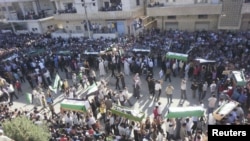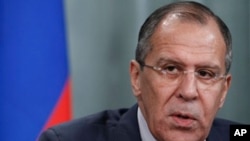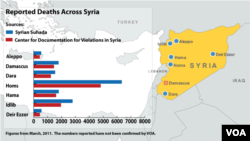Anti-government-related violence across Syria left more than two dozen people dead Saturday, while Russia said it would not object to the departure of Syria's president, under certain conditions.
The bloodiest attack took place in Dara'a. The Syrian Observatory for Human Rights told VOA at least 17 people were killed as government forces pounded targets in the southern city.
Residents of Damascus also reported clashes between Syrian government troops and the opposition Free Syrian Army. There were reports of shooting in the heart of the capital, including the upscale Mazzeh district. That followed clashes in the Barzeh and Kafr Sousah neighborhoods on Friday.
Activists say deadly violence erupted in other areas, on Saturday, including the flashpoint Homs region.
Russia OK with Assad departure
Russian Foreign Minister Sergei Lavrov said Moscow would not object to the departure of Syrian President Bashar al-Assad, if that is the result of a dialogue among Syrians, and not external pressure.
He spoke with reporters Saturday, a day after his deputies discussed Syria's political turmoil with a U.S. envoy.
Members of the opposition Syrian National Council had mixed views on whether Lavrov's comments represent a new stance for Russia, which has been a strong backer of the Assad government.
Council member Ausama Monajed told VOA Lavrov's remarks were "rhetoric."
"What kind of dialogue?" asked Monejad. "If you have a brutal, bloody mafia regime killing its own people, slaughtering children and women, and then you say dialogue, how would you have dialogue with someone who is pointing a gun at your head?"
Syrian National Council member Basma Kodmani said Moscow could be softening its position because Syrian government violence and brutality was becoming an embarrassment to Russia.
"I think what we are seeing now is gradually, but we hope very quickly, a change of position by Russia," she said.
Opposition seeks new leadership
Kodmani commented from Istanbul, where opposition groups have gathered for a two-day conference to select a new leader of the Syrian National Council.
The council, an umbrella group of opposition factions, has been dogged by internal wrangling, and criticism from both inside and outside Syria that led to the resignation last month of Burhan Ghalioun.
One of the most damaging criticisms of the Syrian National Council is that it is dominated by the Sunni Muslim, pro-Islamist Muslim Brotherhood. Observers say that is of particular concern to Syria's Alawites, followers of a branch of Shia Islam. Alawites are a minority in Syria but their members include most of the current regime's senior officials as well as President Bashar al-Assad and his family.
Similar concerns about Muslim Brotherhood domination have been expressed by elements of Syria's large Kurdish minority.
Currently, the only candidate for the council's leadership post is Abdul-Basset Sayda, a Kurdish activist who lives in exile in Sweden. Sayda currently heads the organization's human rights department. His supporters say he will appeal to liberals, Islamists and nationalists in the opposition coalition.
Peace plan compliance monitored
United Nations observers toured the suburbs of Damascus Saturday to assess damage from overnight clashes.
The U.N. teams are monitoring Syrian compliance with the stalled peace plan brokered by international envoy Kofi Annan. The former U.N. secretary-general called for more pressure on Syria during talks in Washington Friday with U.S. Secretary of State Hillary Clinton.
The Assad government contends "armed gunmen" and "terrorists" carry out the deadly attacks that have killed so many civilians recently. Others blame the bloodshed on Syrian government forces and pro-Assad militias.
The state news agency SANA said funerals were held across the country Saturday for 57 law enforcement officers and civilians killed by "terrorists."
The bloodiest attack took place in Dara'a. The Syrian Observatory for Human Rights told VOA at least 17 people were killed as government forces pounded targets in the southern city.
Residents of Damascus also reported clashes between Syrian government troops and the opposition Free Syrian Army. There were reports of shooting in the heart of the capital, including the upscale Mazzeh district. That followed clashes in the Barzeh and Kafr Sousah neighborhoods on Friday.
Activists say deadly violence erupted in other areas, on Saturday, including the flashpoint Homs region.
Russia OK with Assad departure
Russian Foreign Minister Sergei Lavrov said Moscow would not object to the departure of Syrian President Bashar al-Assad, if that is the result of a dialogue among Syrians, and not external pressure.
He spoke with reporters Saturday, a day after his deputies discussed Syria's political turmoil with a U.S. envoy.
Members of the opposition Syrian National Council had mixed views on whether Lavrov's comments represent a new stance for Russia, which has been a strong backer of the Assad government.
Council member Ausama Monajed told VOA Lavrov's remarks were "rhetoric."
"What kind of dialogue?" asked Monejad. "If you have a brutal, bloody mafia regime killing its own people, slaughtering children and women, and then you say dialogue, how would you have dialogue with someone who is pointing a gun at your head?"
Syrian National Council member Basma Kodmani said Moscow could be softening its position because Syrian government violence and brutality was becoming an embarrassment to Russia.
"I think what we are seeing now is gradually, but we hope very quickly, a change of position by Russia," she said.
Opposition seeks new leadership
Kodmani commented from Istanbul, where opposition groups have gathered for a two-day conference to select a new leader of the Syrian National Council.
The council, an umbrella group of opposition factions, has been dogged by internal wrangling, and criticism from both inside and outside Syria that led to the resignation last month of Burhan Ghalioun.
One of the most damaging criticisms of the Syrian National Council is that it is dominated by the Sunni Muslim, pro-Islamist Muslim Brotherhood. Observers say that is of particular concern to Syria's Alawites, followers of a branch of Shia Islam. Alawites are a minority in Syria but their members include most of the current regime's senior officials as well as President Bashar al-Assad and his family.
Similar concerns about Muslim Brotherhood domination have been expressed by elements of Syria's large Kurdish minority.
Currently, the only candidate for the council's leadership post is Abdul-Basset Sayda, a Kurdish activist who lives in exile in Sweden. Sayda currently heads the organization's human rights department. His supporters say he will appeal to liberals, Islamists and nationalists in the opposition coalition.
Peace plan compliance monitored
United Nations observers toured the suburbs of Damascus Saturday to assess damage from overnight clashes.
The U.N. teams are monitoring Syrian compliance with the stalled peace plan brokered by international envoy Kofi Annan. The former U.N. secretary-general called for more pressure on Syria during talks in Washington Friday with U.S. Secretary of State Hillary Clinton.
The Assad government contends "armed gunmen" and "terrorists" carry out the deadly attacks that have killed so many civilians recently. Others blame the bloodshed on Syrian government forces and pro-Assad militias.
The state news agency SANA said funerals were held across the country Saturday for 57 law enforcement officers and civilians killed by "terrorists."






